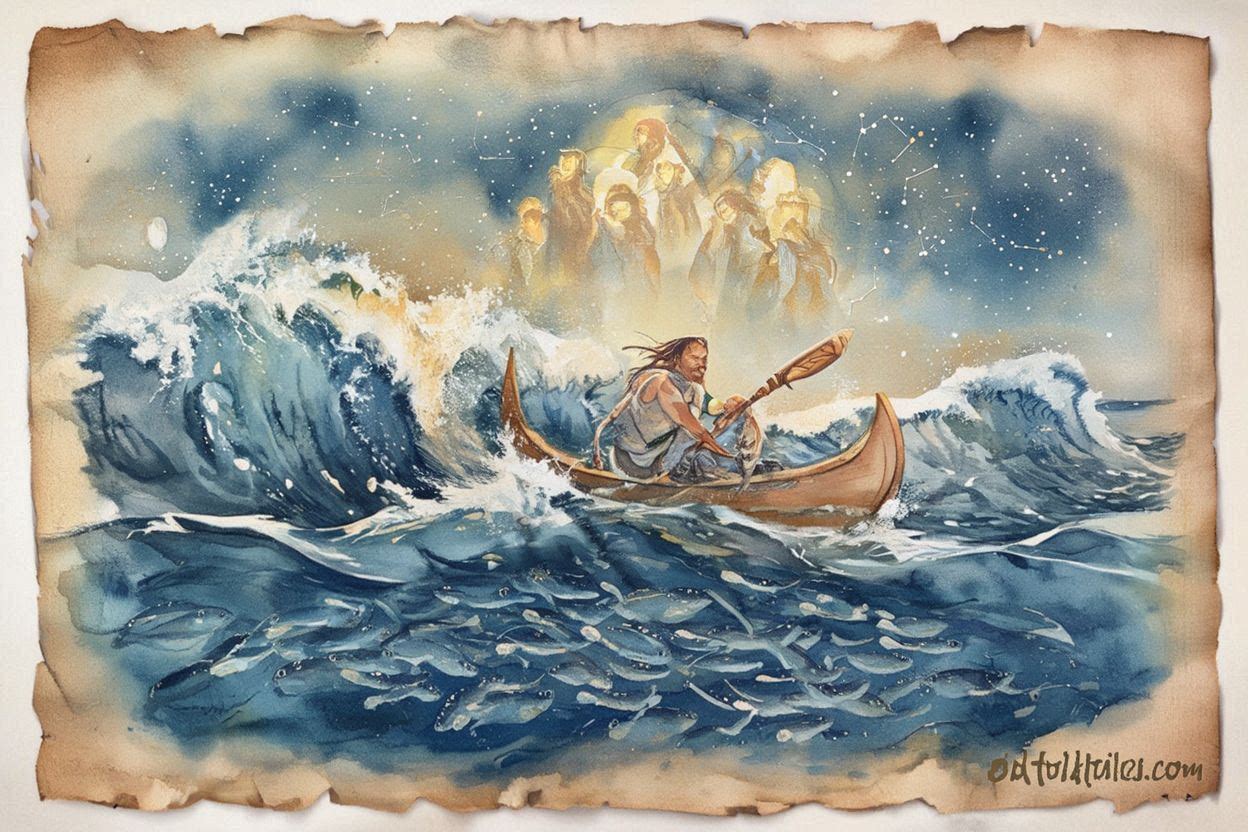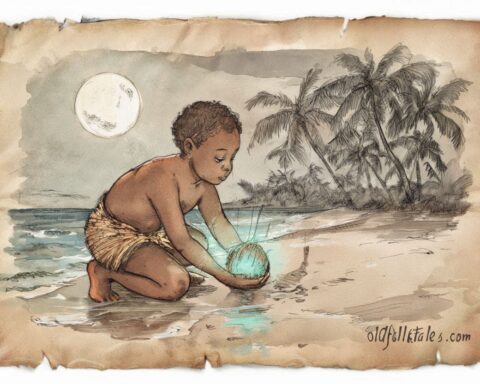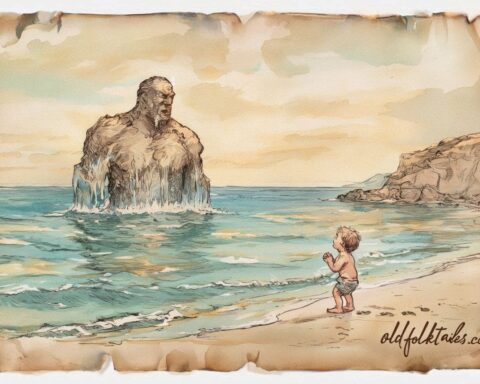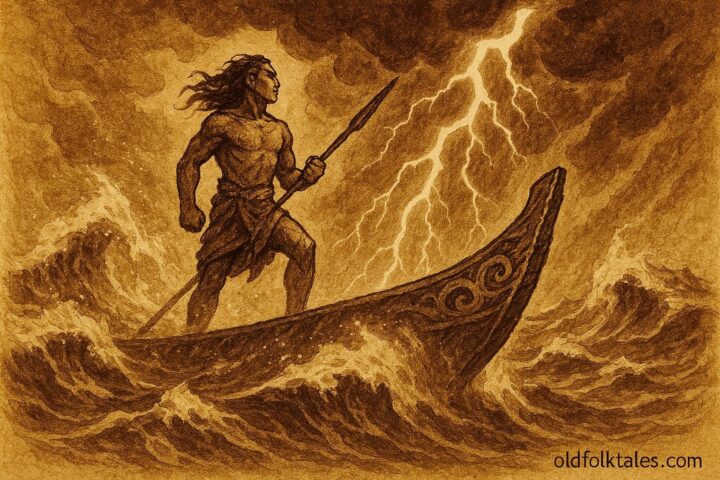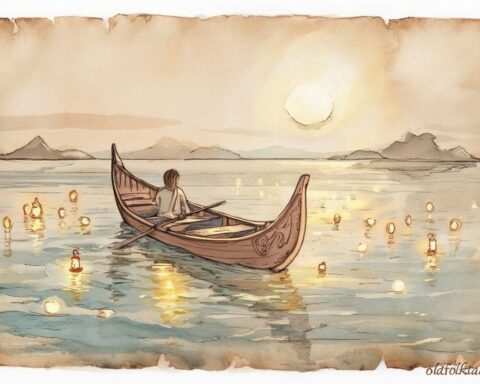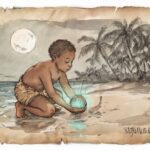Long ago, on one of the coral atolls of Kiribati, the people faced a great famine. The sea, which once provided fish in plenty, had become silent and empty. The nets came up bare, and the children’s laughter faded into hunger. The elders said the ocean spirits were angry, but no one knew how to appease them.
In the village of Abaokoro lived a young man named Tereitaki. He was known for his strength and skill in navigation, but more than that, for his heart that burned with compassion for his people. Every morning, he watched the horizon where the waves broke against the reef, wondering if beyond it lay the answer to their suffering.
One night, as the moon hung low over the lagoon, Tereitaki dreamed of his ancestors. They appeared as glowing figures moving upon the water. “Grandson,” one of them said, “the sea has not abandoned you. Beyond the horizon lies a place where the fish gather in abundance. But the way is guarded by great storms and spirits who test the hearts of men. Go, and carry your courage like a sail.”
When he awoke, Tereitaki knew what he must do. He gathered the elders and said, “I will sail beyond the reefs to find food for our people.” The elders warned him, “The sea is dangerous. Many have vanished beyond its borders.” But Tereitaki only bowed and replied, “If I must give my life so that others may live, I will go.”
He built a strong canoe from breadfruit wood, binding it with sennit rope and blessing it with coconut oil. His mother wept as she placed a garland of pandanus leaves around his neck, whispering prayers to protect him. At dawn, Tereitaki pushed his canoe into the glistening waves, and the entire village stood in silence, watching their hero disappear into the horizon.
The journey began under calm skies. The sea shimmered like glass, and schools of small fish danced around the canoe. But by nightfall, dark clouds gathered, and the wind roared like an angry spirit. The waves rose higher than the palm trees of his village. Lightning split the sky, and the canoe tossed wildly.
“Spirits of the sea,” Tereitaki cried, “I do not come to steal your treasures. I seek only life for my people!”
From beneath the waves rose a monstrous shadow, a giant sea creature with eyes that glowed like fire and a mouth as wide as a cave. It circled the canoe, testing his resolve. Remembering his ancestors’ words, Tereitaki took a deep breath and began to sing an ancient chant taught by the elders. His voice carried through the wind, and the monster paused. Slowly, the creature sank beneath the waves, leaving only ripples of foam behind.
The storm faded. Above him, the stars shone again his celestial map. Guided by their pattern, Tereitaki sailed on for three days and nights. On the fourth day, he saw the sea turn silver with movement. Countless fish, tuna, flying fish, and parrotfish swam in swirling circles. It was the gathering place of the ocean’s bounty.
Tereitaki cast his nets with reverence, whispering, “Let this be enough for my people.” When he pulled them in, they overflowed with fish, so many that his canoe sat low in the water. He gave thanks to the spirits and began his journey home.
But the ocean was not done testing him. A strong current pulled his canoe toward a whirlpool. The water twisted and churned as if trying to swallow him whole. He prayed to his ancestors once more, and from the depths came a glowing light, the same ancestral spirits who had appeared in his dream.
“Tereitaki,” they said, “your courage has opened the path. Hold fast, and the sea will carry you home.”
A calm wave lifted his canoe and pushed it free from the whirlpool’s pull. Exhausted but alive, Tereitaki wept with gratitude.
When he finally reached the shores of Abaokoro, the people rushed to greet him. They saw his canoe heavy with fish and fell to their knees, praising the spirits for his safe return. Tereitaki shared the catch among all the families, ensuring no one went hungry. The elders declared a great feast to honor the hero who had defied the ocean and lived.
As the people ate and sang, Tereitaki stood by the water’s edge, watching the waves shimmer in the moonlight. He whispered, “Thank you, ancestors. May our people never forget that the sea gives life only to those who respect it.”
From that day, Tereitaki’s name was sung in the chants of navigators and carved into the storyboards of the islands. His courage reminded the people that true leadership is not measured by power, but by sacrifice and faith.
Moral Lesson
Tereitaki’s story teaches that courage guided by respect and humility can overcome even the fiercest challenges. A leader’s true strength lies in serving others and honoring the forces of nature that sustain life.
Knowledge Check
1. Why did Tereitaki sail into the open sea?
He sailed to find food for his starving village during a great famine.
2. What guided Tereitaki on his journey?
He was guided by ancestral spirits and the stars.
3. How did Tereitaki overcome the sea monster?
He sang an ancient chant that showed his courage and respect for the sea.
4. What lesson did the ancestors teach Tereitaki?
That bravery and faith in ancestral wisdom lead to success.
5. How did Tereitaki save his people?
He found an abundant place filled with fish and brought the food back home.
6. What does Tereitaki symbolize in Kiribati culture?
He symbolizes courage, wisdom, and leadership in harmony with nature.
Source: Adapted from Kiribati Legends of Sea Heroes by the Kiribati Cultural Centre (2010).
Cultural Origin: Kiribati (Micronesia)
